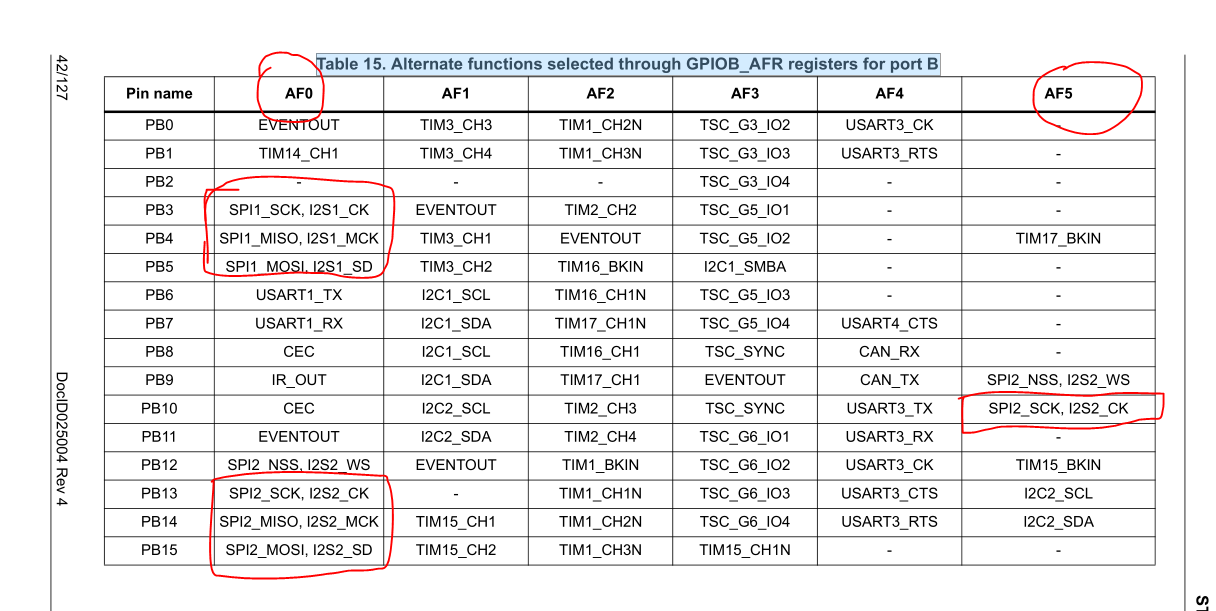STM32F072标准库spi操作细节

最好不要直接在标准库中直接查找(不够详细):
1 /** 2 * @brief Writes data to the specified GPIO data port. 3 * @param GPIOx: where x can be (A, B, C, D, E or F) to select the GPIO peripheral. 4 * @note GPIOC, GPIOD, GPIOE and GPIOF are available only for STM32F072 and STM32F091. 5 * @param GPIO_PinSource: specifies the pin for the Alternate function. 6 * This parameter can be GPIO_PinSourcex where x can be (0..15) for GPIOA, GPIOB, GPIOD, GPIOE 7 * and (0..12) for GPIOC and (0, 2..5, 9..10) for GPIOF. 8 * @param GPIO_AF: selects the pin to used as Alternate function. 9 * This parameter can be one of the following value: 10 * @arg GPIO_AF_0: WKUP, EVENTOUT, TIM15, SPI1, TIM17, MCO, SWDAT, SWCLK, 11 * TIM14, BOOT, USART1, CEC, IR_OUT, SPI2, TIM3, USART4, 12 * CAN, USART2, CRS, TIM16, TIM1, TS, USART8 13 * @arg GPIO_AF_1: USART2, CEC, TIM3, USART1, USART2, EVENTOUT, I2C1, 14 * I2C2, TIM15, SPI2, USART3, TS, SPI1, USART7, USART8 15 * USART5, USART4, USART6, I2C1 16 * @arg GPIO_AF_2: TIM2, TIM1, EVENTOUT, TIM16, TIM17, USB, USART6, USART5, 17 * USART8, USART7, USART6 18 * @arg GPIO_AF_3: TS, I2C1, TIM15, EVENTOUT 19 * @arg GPIO_AF_4: TIM14, USART4, USART3, CRS, CAN, I2C1, USART5 20 * @arg GPIO_AF_5: TIM16, TIM17, TIM15, SPI2, I2C2, USART6, MCO 21 * @arg GPIO_AF_6: EVENTOUT 22 * @arg GPIO_AF_7: COMP1 OUT, COMP2 OUT 23 * @note The pin should already been configured in Alternate Function mode(AF) 24 * using GPIO_InitStruct->GPIO_Mode = GPIO_Mode_AF 25 * @note Refer to the Alternate function mapping table in the device datasheet 26 * for the detailed mapping of the system and peripherals'alternate 27 * function I/O pins. 28 * @retval None 29 */ 30 void GPIO_PinAFConfig(GPIO_TypeDef* GPIOx, uint16_t GPIO_PinSource, uint8_t GPIO_AF)
具体操作配置:
// spi2 的初始化 void SPI2_idev_Init( void) { GPIO_InitTypeDef GPIO_InitStructure; SPI_InitTypeDef SPI_InitStructure; RCC_AHBPeriphClockCmd( RCC_AHBPeriph_GPIOB, ENABLE ); RCC_APB1PeriphClockCmd( RCC_APB1Periph_SPI2, ENABLE ); GPIO_PinAFConfig(GPIOB, GPIO_PinSource10 , GPIO_AF_5); // 使用的引脚是 PORTB.10 GPIO_PinAFConfig(GPIOB, GPIO_PinSource14 , GPIO_AF_0); GPIO_PinAFConfig(GPIOB, GPIO_PinSource15 , GPIO_AF_0); GPIO_InitStructure.GPIO_Pin = GPIO_Pin_15 |GPIO_Pin_14|GPIO_Pin_10; GPIO_InitStructure.GPIO_Mode = GPIO_Mode_AF; GPIO_InitStructure.GPIO_Speed = GPIO_Speed_Level_3; GPIO_InitStructure.GPIO_OType = GPIO_OType_PP; GPIO_InitStructure.GPIO_PuPd = GPIO_PuPd_UP; GPIO_Init(GPIOB, &GPIO_InitStructure); GPIO_SetBits(GPIOB, GPIO_Pin_15 |GPIO_Pin_14|GPIO_Pin_10); SPI_I2S_DeInit( SPI2);// 复位 SPI_InitStructure.SPI_Direction = SPI_Direction_2Lines_FullDuplex; SPI_InitStructure.SPI_Mode = SPI_Mode_Master; SPI_InitStructure.SPI_DataSize = SPI_DataSize_8b; SPI_InitStructure.SPI_CPOL = SPI_CPOL_Low; SPI_InitStructure.SPI_CPHA = SPI_CPHA_1Edge; SPI_InitStructure.SPI_NSS = SPI_NSS_Soft; SPI_InitStructure.SPI_BaudRatePrescaler = SPI_BaudRatePrescaler_2; SPI_InitStructure.SPI_FirstBit = SPI_FirstBit_MSB; SPI_InitStructure.SPI_CRCPolynomial = 7; SPI_Init(SPI2, &SPI_InitStructure); SPI_RxFIFOThresholdConfig( SPI2,SPI_RxFIFOThreshold_QF); // 与stm32f1xx 主要区别点 SPI_Cmd(SPI2, ENABLE); }
// SPI 写8位
void SPI2_WriteByte(uint8_t data) { while((SPI2->SR&SPI_I2S_FLAG_TXE)==RESET); // 等待发送区为空 SPI_SendData8(SPI2,data); } // SPI 读写 uint8_t drv_spi_read_write_byte( uint8_t TxByte ) { uint16_t retry=0; while (SPI_I2S_GetFlagStatus(SPI2, SPI_I2S_FLAG_TXE) == RESET) // 等待发送区为空 { retry++; if(retry>400) { return 0; } } SPI_SendData8(SPI2, TxByte); retry=0; while (SPI_I2S_GetFlagStatus(SPI2, SPI_I2S_FLAG_RXNE) == RESET) //等待接收缓冲区为空 { retry++; if(retry>400) { return 0; } } return SPI_ReceiveData8(SPI2); }
这样就基本没有什么问题的啦


 浙公网安备 33010602011771号
浙公网安备 33010602011771号